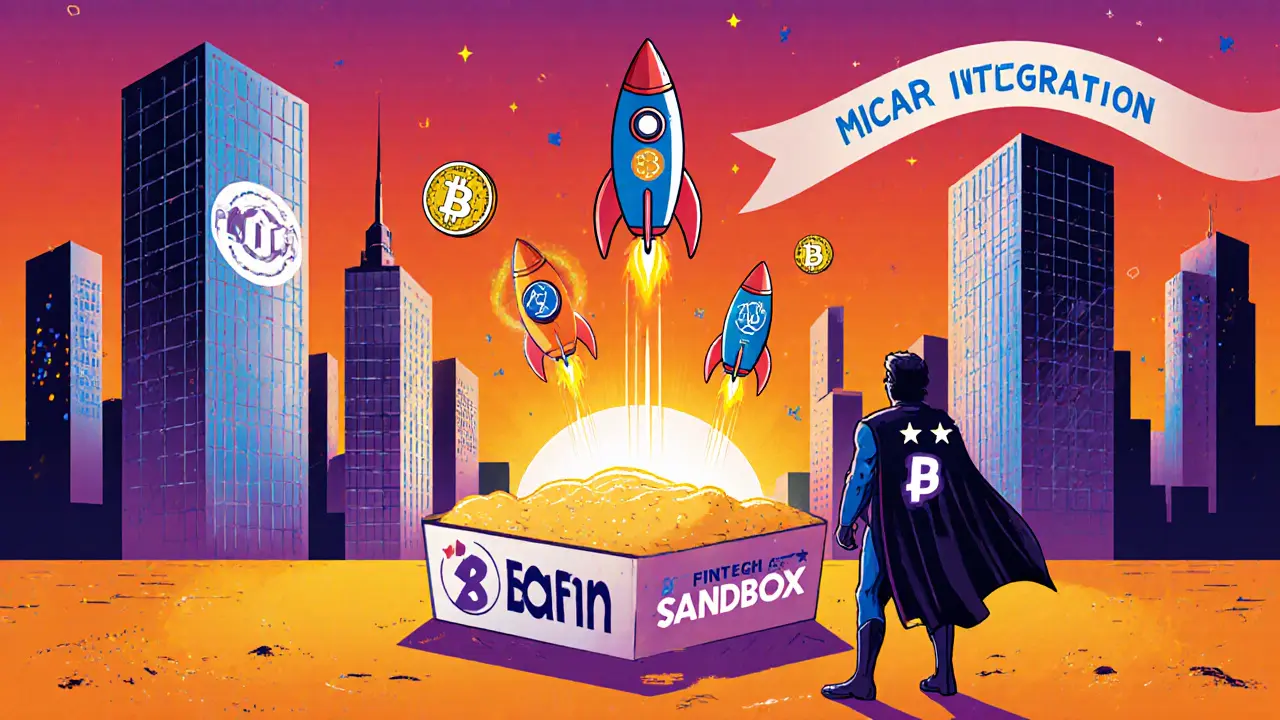Germany has become the go‑to place for crypto businesses that want clear rules instead of a legal gray zone. At the heart of that certainty is BaFin, the Federal Financial Supervisory Authority, which now enforces a tight web of EU and national regulations on every crypto‑asset service that touches the German market.
Why BaFin matters for crypto firms
Since recognizing Bitcoin as a "unit of account" back in 2013, BaFin has transformed from a cautious watchdog into a full‑blown crypto regulator. The authority now applies the EU’s Markets in Crypto‑Assets Regulation (MiCAR) together with Germany’s own Acts - the Digitalisation of the Financial Market Act (FinmadiG) and the Crypto‑Markets Supervision Act (KMAG) - to create a single compliance landscape.
The legal backbone: key statutes you must know
Four pieces of legislation shape the rules:
- German Banking Act (KWG): Classifies most crypto assets, stablecoins and security tokens as financial instruments, triggering mandatory licensing.
- FinmadiG: Introduces transitional provisions that let existing licences survive until the end of 2025, while new entrants must align with MiCAR.
- KMAG: Specifically targets crypto‑market operators, spelling out supervision requirements and IT‑security standards.
- MiCAR: Provides a Europe‑wide baseline for token offerings, custody, trading platforms and the “travel rule”.
When do you need a BaFin licence?
Not every crypto activity triggers a licence. BaFin draws a line based on the type of service provided:
| Service | License Required? | Key Legal Basis |
|---|---|---|
| Custody of crypto assets for third parties | Yes | KWG §1 (1a) no. 1, KMAG |
| Operating a crypto‑exchange or trading platform | Yes | KWG §1 (1a) no. 2, MiCAR |
| Accepting crypto as payment for goods/services | No (unless payment processor is unlicensed) | KWG §2, BaFin guidance 2025 |
| Issuing a utility token without investment features | No (white‑paper filing only) | MiCAR Art. 5 |
| Providing DeFi lending or staking as a service | Yes (considered financial intermediation) | KWG §1 (1a) no. 4, KMAG |
If you fall into a “Yes” row, you must apply for BaFin authorisation before you start. The process now averages three to six months thanks to streamlined documentation templates introduced after the Wirecard scandal.
Anti‑money‑laundering (AML) and the travel rule
BaFin enforces the German Crypto Asset Transfer Regulation (KryptoWTransferV), which implements the FATF “travel rule”. Every crypto transfer above €1,000 (or the equivalent in crypto) must carry originator and beneficiary data that can be shared with the receiving entity. Failure to collect this data can lead to hefty fines and, in extreme cases, a forced shutdown of operations.
Key compliance steps:
- Integrate a KYC/AML solution that captures full name, address, date of birth and government ID for both parties.
- Store transaction logs for at least five years, including blockchain hash, timestamp and counterparties.
- Conduct ongoing monitoring for patterns that indicate structuring or rapid turnover of tokens.

Recent enforcement: the Ethena GmbH case
On 25 June 2025 BaFin ordered the winding‑up of Ethena GmbH’s USDe stablecoin activity. The regulator appointed a special representative to oversee token redemption, giving holders a deadline of 6 August 2025. The case highlighted two lessons:
- Even if a stablecoin is pegged to a foreign currency, providing it to German users means you need a full licence under KWG.
- BaFin will intervene quickly when a token is marketed without the required white‑paper filing under MiCAR.
Tax updates from the Federal Ministry of Finance (BMF)
In March 2025 the BMF issued new circulars that replace the vague term “virtual currencies” with “crypto assets”. The guidance draws a line between active staking (taxed as income) and passive staking (treated as a capital‑gain). It also forces businesses to keep a daily market‑price overview for valuation purposes. For crypto‑focused startups, the takeaway is simple: build a robust accounting pipeline now, or you’ll drown in retro‑active reporting later.
Step‑by‑step: getting BaFin authorisation
- Self‑assessment: Map your services against the licensing table above. If any “Yes” appears, prepare for a licence.
- Prepare documentation: Business plan, risk‑management framework, IT‑security concept (minimum ISO 27001 alignment), AML/KYC policies, and a draft white‑paper if you issue tokens.
- Submit application: Use BaFin’s online portal, attach all PDFs, and pay the €5,000‑€25,000 fee (tiered by service scope).
- Regulatory review: BaFin will request clarifications within 30 days. Respond promptly; delays add weeks.
- Authorization: Once approved, you receive a licence certificate valid for five years, with annual supervisory reports required.
Businesses that skip the white‑paper filing or ignore KryptoWTransferV data fields often see their applications rejected outright.

Common pitfalls and how to avoid them
- Relying on a foreign licence alone: BaFin treats active marketing to German residents as a domestic connection, meaning foreign authorisations don’t exempt you.
- Using unlicensed payment processors: Even if you only accept crypto as payment, a third‑party processor that converts crypto to euros must hold a BaFin licence.
- Under‑estimating IT‑security duties: KMAG mandates regular penetration testing and a documented incident‑response plan. Failure leads to supervisory penalties.
- Missing the 2025 grandfathering deadline: Existing licences stay valid only until 31 December 2025. Start the MiCAR‑compliant transition now.
Future outlook: what’s next for crypto regulation in Germany?
MiCAR is set to fully replace national crypto rules by 2026, but BaFin will retain oversight authority. Expect tighter supervision of DeFi protocols, clearer rules on token‑backed securities, and a possible “sandbox” expansion for innovative projects that can demonstrate robust AML controls.
Key Takeaways
- BaFin is the single gatekeeper for any crypto‑service targeting German users.
- Licensing depends on service type - custody, exchange, and DeFi intermediation all need a licence.
- KryptoWTransferV enforces the travel rule; collect originator/beneficiary data for every transfer.
- Recent enforcement (Ethena GmbH) shows BaFin won’t hesitate to shut down unlicensed stablecoin activities.
- Start the MiCAR‑compliant licence application now; the 2025 grandfathering window closes soon.
Frequently Asked Questions
Do I need a BaFin licence if I only accept Bitcoin as payment?
No licence is required for pure merchant acceptance, but you must use a payment processor that is itself licensed in Germany. If the processor converts Bitcoin to euros, it must hold a BaFin licence.
What is the difference between MiCAR and German law?
MiCAR provides EU‑wide rules for token offerings, custody and trading platforms. German law (KWG, KMAG, FinmadiG) implements those rules nationally and adds stricter IT‑security and supervisory reporting requirements.
How long does the BaFin authorisation process take?
Since 2024 BaFin aims for a 3‑to‑6‑month timeline for crypto‑service licences, provided the applicant submits a complete dossier and responds quickly to any queries.
What penalties can BaFin impose for AML breaches?
Violations of KryptoWTransferV can lead to fines up to €500,000 per infraction, temporary suspension of services, or a full shutdown of the offending business.
Is there a sandbox for testing new crypto products?
BaFin runs a FinTech sandbox that accepts crypto projects with proven AML controls. Participants receive temporary relief from certain reporting obligations while they validate their model.

Write a comment